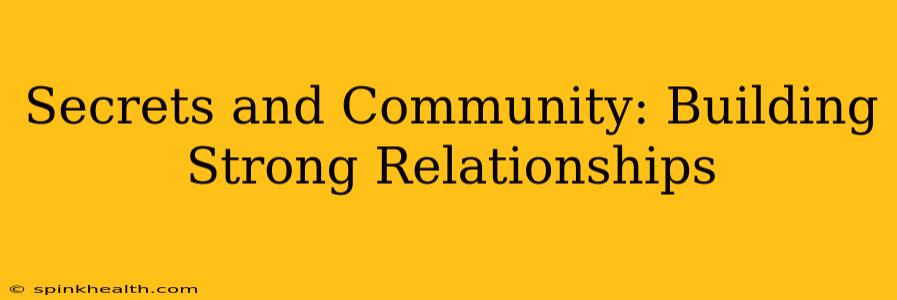Building strong relationships within a community hinges on trust, openness, and a shared sense of belonging. While the idea of sharing secrets might seem counterintuitive to maintaining healthy relationships, a carefully considered approach to vulnerability and confidentiality can actually strengthen the bonds within a community. This article explores the delicate balance between sharing and protecting, and how this nuanced approach can foster deeper connections.
What are the benefits of sharing secrets in a community?
Sharing secrets, when done appropriately, can foster a sense of intimacy and closeness within a community. Vulnerability creates space for empathy and understanding, allowing members to connect on a deeper, more meaningful level. This shared vulnerability can build trust and strengthen the bonds that hold the community together. For instance, sharing a personal struggle or a past experience can create a sense of camaraderie and shared humanity, fostering a supportive environment where members feel safe and accepted. However, it's crucial to remember that this sharing must be done with careful consideration of the context and the potential impact on others.
How can secrets damage relationships within a community?
Conversely, secrets can significantly damage relationships within a community if not handled responsibly. Betrayal of trust, whether through intentional malicious gossip or unintentional careless sharing, can erode the foundation of the community. The spread of damaging information can fracture relationships, create cliques, and ultimately lead to the disintegration of the group. This is particularly true if the secrets shared are sensitive or potentially damaging to the reputation of others within the community. Therefore, discretion and thoughtful consideration are paramount.
What types of secrets should be shared within a community?
The type of secrets shared should be carefully considered. Sharing personal experiences that promote understanding and empathy, fostering a sense of shared humanity, is generally positive. For instance, openly discussing struggles with mental health, career challenges, or personal growth can create a supportive and inclusive environment. However, secrets that could harm or endanger others should never be shared. Similarly, secrets that could compromise the privacy or confidentiality of others should be avoided at all costs.
How to share secrets without damaging relationships?
Sharing secrets requires a delicate balance. Consider the following:
- Trust: Only share secrets with individuals you deeply trust and who have demonstrated their commitment to confidentiality.
- Context: Be mindful of the context in which you share the secret. A casual setting might not be appropriate for sensitive information.
- Consent: Ensure you have the consent of the person whose secret you are sharing, if it involves them.
- Discretion: Exercise discretion and avoid gossiping or spreading the secret further.
- Boundaries: Respect the boundaries of others. If someone is uncomfortable sharing, respect their decision.
What if someone in the community betrays your trust by sharing your secrets?
Betrayal of trust is incredibly damaging. Address the situation directly with the person who violated your trust, expressing your feelings calmly and clearly. If the situation can't be resolved, it may be necessary to re-evaluate your relationship with that person and potentially limit your interactions. In some cases, community intervention or mediation may be necessary to restore trust.
How can communities build trust and encourage healthy sharing?
Strong communities actively cultivate trust through transparent communication, clear guidelines regarding confidentiality, and a culture of mutual respect and support. Establishing clear boundaries around what constitutes acceptable sharing is crucial. Leaders should model appropriate behavior and actively address any violations of trust. Regular community discussions about the importance of confidentiality and healthy communication can help maintain a safe and supportive environment.
By carefully navigating the complex dynamics of sharing and protecting, communities can leverage the power of vulnerability to build stronger, more meaningful relationships. Remember, the key lies in thoughtful consideration, mutual respect, and a commitment to fostering a safe and supportive environment for all members.

